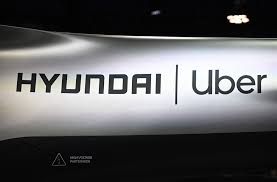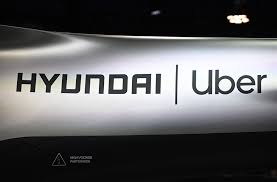
South Korean automaker Hyundai Motor and the United States based ride hailing firm Uber has decided to join resources to jointly develop electric air taxis, the companies said in a statement. This is another partnership between companies in the auto sector to leverage their position in the race for development of small self-flying cars aimed at easing urban congestion.
Investments in startups that are working towards developing and deploying electric flying cars that have the capability to takeoff and landing vertically have already been named by global auto companies including Germany’s Daimler, China’s Geely Automobile and Japan’s Toyota.
However, analysts say that commercialization of such plans needs to tackle a number of big technological and regulatory hurdles.
For example, these challenges were underlined as widely different timelines for commercialization was given by Uber and Hyundai.
“We’ve been making steady progress toward a goal of launching Uber Air by 2023,” Eric Allison, head of Uber Elevate, said at the Consumer Electronics Show (CES) in Las Vegas.
Hyundai hopes that by 2028, it would be possible to commercialize of urban air mobility service, said Euisun Chung, Executive Vice Chairman of Hyundai. He said that it takes time for laws and systems to be in place.
While Boeing subsidiary Aurora Flight Sciences is among one of the partner firms to Uber’s air taxi project, Hyundai is the first carmaker to join the project.
While Uber will provide aerial ride-share services, vehicles will be produced and deployed by Hyundai.
A total of eight companies are partners of Uber in the air taxi project and the ride hailing company has acknowledged the fact that it would be “unrealistic” if one expects that all of the partner companies would want to go to the market within the same time frame.
“Our plans for our limited commercial operations in 2023 will likely involve other partners,” Sarah Abboud, Communications Manager at Uber, told the media.
A concept electric aircraft developed with Uber will be unveiled by Hyundai at CES. This prototype has been designed to be able to carry up to four passengers together with the pilot and fly on trips of up to 60 miles (100 km).
“The overall cost to produce and operate UAM (urban air mobility) vehicles should be really low enough for everyone to enjoy the freedom to fly,” Shin Jai-won, Head of Urban Air Mobility Division at Hyundai Motor, said.
Concept cars for air taxi projects comprise of a variety of shapes and sizes and include those running on electric power replacing jet engine power and with rotating wings and, in some cases, rotors in place of propellers.
Hyundai’s Shin, a former NASA engineer hired by the automaker last year, estimated that the value of the urban flight market will be more than the current number of commercial airplanes flying around the world - about 25,000. He however did not provide any timeframe for the estimate.
A pledge to invest 1.8 trillion won ($1.5 billion) by 2025 in what it called “urban air mobility” was announced by Hyundai last year.
(Source:www.thetimesofindia.com)
Investments in startups that are working towards developing and deploying electric flying cars that have the capability to takeoff and landing vertically have already been named by global auto companies including Germany’s Daimler, China’s Geely Automobile and Japan’s Toyota.
However, analysts say that commercialization of such plans needs to tackle a number of big technological and regulatory hurdles.
For example, these challenges were underlined as widely different timelines for commercialization was given by Uber and Hyundai.
“We’ve been making steady progress toward a goal of launching Uber Air by 2023,” Eric Allison, head of Uber Elevate, said at the Consumer Electronics Show (CES) in Las Vegas.
Hyundai hopes that by 2028, it would be possible to commercialize of urban air mobility service, said Euisun Chung, Executive Vice Chairman of Hyundai. He said that it takes time for laws and systems to be in place.
While Boeing subsidiary Aurora Flight Sciences is among one of the partner firms to Uber’s air taxi project, Hyundai is the first carmaker to join the project.
While Uber will provide aerial ride-share services, vehicles will be produced and deployed by Hyundai.
A total of eight companies are partners of Uber in the air taxi project and the ride hailing company has acknowledged the fact that it would be “unrealistic” if one expects that all of the partner companies would want to go to the market within the same time frame.
“Our plans for our limited commercial operations in 2023 will likely involve other partners,” Sarah Abboud, Communications Manager at Uber, told the media.
A concept electric aircraft developed with Uber will be unveiled by Hyundai at CES. This prototype has been designed to be able to carry up to four passengers together with the pilot and fly on trips of up to 60 miles (100 km).
“The overall cost to produce and operate UAM (urban air mobility) vehicles should be really low enough for everyone to enjoy the freedom to fly,” Shin Jai-won, Head of Urban Air Mobility Division at Hyundai Motor, said.
Concept cars for air taxi projects comprise of a variety of shapes and sizes and include those running on electric power replacing jet engine power and with rotating wings and, in some cases, rotors in place of propellers.
Hyundai’s Shin, a former NASA engineer hired by the automaker last year, estimated that the value of the urban flight market will be more than the current number of commercial airplanes flying around the world - about 25,000. He however did not provide any timeframe for the estimate.
A pledge to invest 1.8 trillion won ($1.5 billion) by 2025 in what it called “urban air mobility” was announced by Hyundai last year.
(Source:www.thetimesofindia.com)





